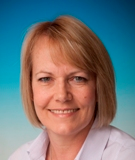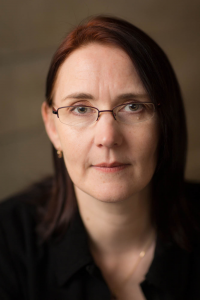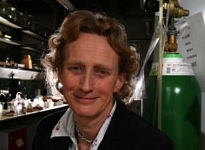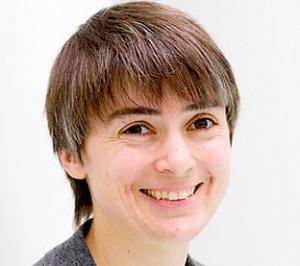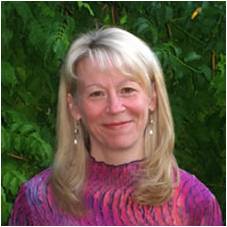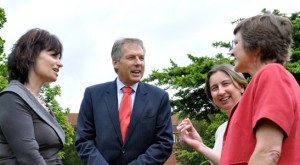Archive of Campbell Lectures
Campbell Lecture 2020
Professor Diana Eccles – Luck is where opportunity meets preparation
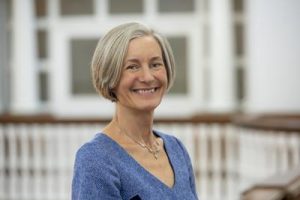
Professor Diana Eccles, Dean of Medicine and Professor of Cancer Genetics at the University of Southampton, and the university’s Athena Swan lead, gave an inspirational talk about her outstanding career in this year’s Campbell lecture. She graduated from Manchester University on 1983 and has trained in Manchester, Edinburgh and Southampton. After training in general medicine, then specialist training in adult oncology she worked on the molecular genetics of ovarian cancer in the MRC Human Genetics Unit in Edinburgh to gain her MD in 1992. She then moved to Southampton to a research post in Genetic Epidemiology simultaneously training in Clinical Genetics and when appointed to a consultant post in Southampton in 1995 she set up one of the first NHS funded Cancer Genetics Services in the UK within the Wessex Clinical Genetics Service.
Diana gave valuable insights into the various decision she faced in her professional and personal life. When faced with a kind of cross road, which life occasionally throws at us, Diana likes to consult friends and mentors before forming a decision.
A video recording of Diana’s lecture is available here.
Campbell Lecture 2019
Professor Penny Endersby
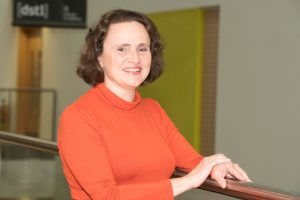
The 2019 Campbell Lecture speaker was Professor Penny Endersby, Division Head, Cyber and Information Systems Division, Dstl. Penny walked the audience through her career and how it has developed alongside the defence sector. Penny spent ten years as a researcher into novel armour systems, ending as the UK expert on electric and intelligent armours. She led several groups in Dstl’s Physical Sciences Department before taking over as the department manager in 2009. During this time she was appointed a fellow of the Institute of Physics and served as a member of their governing council. In 2012, she transferred to lead the Information Management department, leading to her appointment as Head of Cyber and Information Systems Division in 2015. Penny held a visiting professorship at Southampton University in Electronics and Computer Science and moved to be Chief Executive of the Met Office in December 2018.
Campbell Lecture 2017
Dr Michelle Thomsen
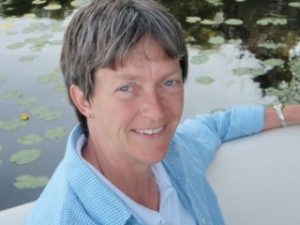
Dr Michelle Thomsen gave the 14th Campbell lecture, entitled “Vicarious voyages into space”. Michelle is a Senior Scientist at the Planetary Science Institute and a Visiting Scientist at the Los Alamos National Laboratory. She is currently a Diamond Jubilee International Visiting Fellow at the University of Southampton. The University Women in Science, Engineering & Technology (WiSET) group would like to invite staff and students to this year’s Campbell Lecture with Dr Michelle Thomsen.
Abstract: From a childhood steeped in the early days of the space race, to a career that has spanned the golden age of robotic planetary exploration, I have been privileged to participate in some very exciting “firsts” of space missions, such as the first spacecraft to encounter Jupiter and Saturn, the first close encounters with a comet, the first detailed observations of Earth’s interaction with the expanding solar atmosphere, and the first orbiter around Saturn. Along this journey I found challenges, as well as helping hands that made it all possible. I will describe some of the highlights of my space voyage, along with lessons I have learned along the way, both professional and personal.
The video of the event is available via youtube here
Campbell Lecture 2016
Belinda Phipps
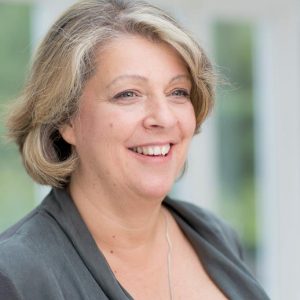
Belinda Phipps gave the 13th Campbell lecture. She has been described as a ‘super-parent’ by The Telegraph. She has covered a number of roles through her wide and diiverse career, starting withh a BSc in microbiology. She then used her skills to make a positive impact in a number of companies, starting from her first work experience with Glaxo, she then moved on towards a number of high responsibility roles. These include managing director of South Thames Blood Transfusion Service, Oxford clinical Comms mmanaging director, chief executive for the East Berks Community Health NHS Trust and chief executive for the National Childbirth trust for 15 years. The NCT is a charity for the first 1,000 days of parenthood, which aims to support parents through service delivery, campaigning, lobbying and changing practice and attitudes.
She is the current Chair of the Fawcett Society, which is the leading gender equality charity with a 150 year history. Appointed as chair to reverse 5 years of falling income and loss. Fawcett made its first surplus in the last financial year, reversing the loss making trend. She is also the CEO of the Science Council, an umbrella body for Scientific Professional Bodies.
Campbell Lecture 2015
Professor Jane Francis and Suw Charman-Anderson gave the 12th Annual Campbell Lecture.
Professor Jane Francis
Jane Francis is Director of the British Antarctic Survey, Cambridge. A geologist by training from the University of Southampton, she was a NERC Postdoctoral Fellow in London, palaeobotanist at the British Antarctic Survey, Australian Research Fellow at the University of Adelaide, lecturer at the University of Leeds, and a Royal Society Leverhulme Trust Senior Research Fellow. From 2008-13 she was Dean of the Faculty of Environment at the University of Leeds. Her interests include ancient climates and she studies fossil plants from the Arctic and Antarctica to decipher high-CO2 climates of the past. She was awarded the Polar Medal for her contribution to British polar research
Going to the ends of the Earth to be a woman in science
The polar regions were once considered to be remote, harsh, cold, physically challenging – and no place for a woman. These days there are many women who work in the Arctic and Antarctica, following their passion for science. I will present some of my own work as a geologist in the polar regions and the pathway that has taken me to the ends of the Earth.
Suw Charman-Anderson
Suw Charman-Anderson is the founder of Ada Lovelace Day, an international celebration of the achievements of women in science, technology, engineering and maths. Each year, ALD hosts flagship science cabaret event in London, whilst around the world independent groups put on their own events. Last year, Ada Lovelace Day Live! itself was hosted by the venerable Royal Institution, and there were over 65 grassroots events in 13 different countries on five continents.
Suw is a social technologist and, as one of the UK’s social media pioneers, has worked with clients worldwide. A freelance journalist, she has written about social media, technology and publishing for The Guardian, CIO Magazine and Forbes. She also co-founded the Open Rights Group in 2005.
Learn more about Ada Lovelace Day at www.findingada.com.
The Invention of Career
Whenever we assess other people’s professional careers, it’s tempting to interpret them as a mindful progression from job to more senior job, but the truth is almost always messier than that. We like to think that our professional lives are neatly bundled fairy tales with beginnings, middles and endings. Drawing on her own experience, Suw will talk about how such a view obscures an important modern truth: that you can invent your own job, that new professions pop up seemingly out of nowhere, and the career you have in 5 years might not even exist yet.
Campbell Lecture 2014
Professor Curt Rice and Dame Professor Athene Donald DBE FRS gave the 11th Annual Campbell lecture.
Professor Curt Rice
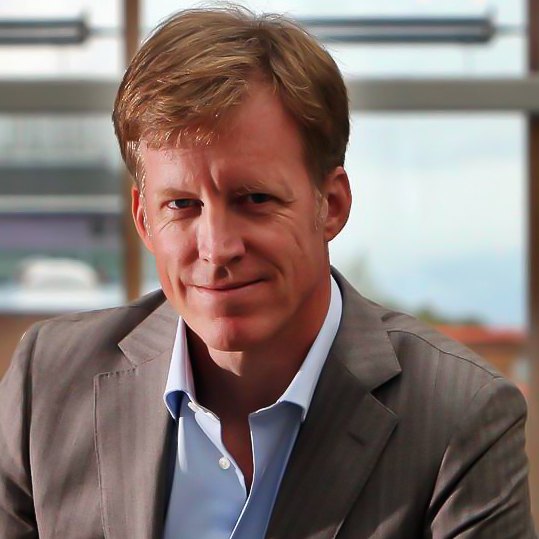
In a break with tradition, but in the spirit of inclusion and honouring diversity, we have also asked a man to take part in the Campbell Lecture, namely Professor Curt Rice. He is a Fellow at the Netherlands Institute for Advanced Study. From 2009–2013, he served as the elected Vice Rector for Research and Development (prorektor for forskning og utvikling) at the University of Tromsø, where he is a professor of linguistics. Before that, from 2002–2008, he was the founding director of their Norwegian Center of Excellence, the Center for Advanced Study in Theoretical Linguistics, or CASTL.
Curt is also a champion of women in academia and strong proponent of gender balance in higher education.
Confessions of a male sexist
Professor Rice will argue that the core challenge to improving gender balance is finding ways to overcome implicit bias. The cultures in which we live lead us as individuals to have different associations for men and women and their roles in the workplace. These implicit biases play themselves out in hiring processes, promotion, salary assignment, grant reviews, even in citation practices. Rice will highlight some of the most exciting research on this topic and then will discuss a specific project designed to counter these effects that he led while he was Pro Vice Chancellor for Research at the University of Tromsø. Tromsø has radically changed its gender balance profile, whereby they progressed over 10 years from being the worst university in Norway with only 9% women among full professors, to being the best in Norway, with over 30% women as full professors.
Dame Professor Athene Donald DBE FRS
We have invited Dame Professor Athene Donald DBE FRS, Professor of Experimental Physics at University of Cambridge, Chair of the Royal Society’s Education Committee, and long-time champion of women in science to address us.
A Personal Consideration of Career Trajectories and Facilitating Women’s Progression
“Careers certainly need not go in straight lines or follow a pre-determined path, and this is certainly the case of my own. I think it is important to recognize that chance as well as hard work and determination play their part and women need to be ready to seize opportunities that come their way and overcome their fears. I will consider how both the individual and institutions can facilitate women’s career progression.”
If you want to find out more about these wonderful speakers why not start with their blog pages http://occamstypewriter.org/athenedonald/ and http://curt-rice.com/about/
Campbell Lecture 2012
Professor Ottoline Leyser
Professor Ottoline Leyser gave the 9th Campbell lecture, entitled ‘Women in science – the glass half full”
Abstract: Women are under-represented in science. The reasons are often different for the different science disciplines. In the Biosciences, there are more than 50% women at undergraduate level, but they progressively disappear along the leaky pipeline of the academic career. There is a lot of discussion about why this might be, and the discussion is almost all about how very difficult everything is. While it is certainly true that academic careers are competitive, the negativity in the discussion about academic careers in science and the ability of women to pursue them is in my view a self-fulfilling prophecy. If women are endlessly being told how difficult everything is, why would they choose to follow the academic career path when there are so many others available to them? And interestingly, why do men disproportionately choose to stick with the “difficult” career? I think there needs to be more emphasis on the range of career options available and their diverse merits, so that everyone is choosing their career path based more on positives, and less on negatives.
Campbell Lecture 2011
Professor Geraldine Richmond, University of Oregon
Professor Geraldine Richmond gave the 8th Campbell lecture, entitled “Increasing the Stature and Leadership Opportunities of Women in Science and Technology”
Abstract: Strong leadership in science and technology is critically important in sustaining life on this planet and assuring the health and well-being of its inhabitants. These leadership roles are broad and diverse, from the science instructor that teaches and nurtures the emerging scientist, to the director of a research group or laboratory, to the federal agency worker or political appointee who assists in setting policy and funding national priorities. Women scientists and engineers have much to contribute in these roles but often face many obstacles in achieving them and having an impact in these positions. In this presentation I will share my experience in this area and the experiences of the thousands of women that we have helped achieve their career goals through our COACh program. What we have learned about the role that institutions and mentors can play in this area will also be discussed.
The University of Southampton Women in Science, Engineering and Technology (WISET) group was launched in 2002. The group’s mission is to support women in Science, Engineering, and Technology (SET) to achieve their full potential by shaping the policies and culture of our University.
Professor Geraldine Richmond is Professor in the Department of Chemistry and Materials Science Institute at the University of Oregon. She holds numerous prestigious professional awards in Chemistry and is the founder and chair of COACh (Committee on the Advancement of Women Chemists), an organization assisting in the advancement of women faculty in the sciences. Over 4000 science faculty, students, postdocs and administrators around the United States and abroad have benefitted from professional training and networking workshops developed by COACh. She has been honored for these efforts by the Presidential Award for Excellence in Science and Engineering Mentoring (1997), the American Chemical Society Award for Encouraging Women in the Chemical Sciences (2005) and the Council on Chemical Research Diversity Award (2006). More information about Prof Richmond can be found at http://richmondscience.uoregon.edu/
Campbell Lecture 2010
Professor Anne Glover
Professor Anne Glover gave the 7th Annual Campbell Lecture on 20th May 2010, entitled: “A life of sex, drugs and rock and roll”. Professor Glover stated: “Curiosity and impatience have been the two major forces in my career. I have changed research areas several times and also commercialised some of my research output. I never gave much thought to being a “woman in a man’s world” at the beginning of my career but soon became aware that my working environment was being controlled mostly by men so I needed to make sure that I understood the rules. This made life a lot simpler!”
In her talk she shared some of her experiences in the hope it might make life easier for others (both men and women!). Professor Glover holds a Personal Chair of Molecular and Cell Biology at the University of Aberdeen, and has honorary positions at the Rowett and Macaulay Institutes. She is an elected Fellow of the Royal Society of Edinburgh, a member of the Natural Environment Research Council, and a Fellow of the American Academy of Microbiology. She has an active research group pursuing a variety of areas from microbial diversity to the development and application of whole cell biosensors (biological sensors) for environmental monitoring and investigating how organisms respond to stress at a cellular level. Professor Glover, has been writing a blog for GetSETWomen with interesting discussions on aspirations, challenges and mentoring. She is a member of GetSET Women and has supported the work of the UKRC and the Scottish Resource Centre for Women in SET in various ways. In 2008 she was one of six Women of Outstanding Achievement in SET. Professor Glover has a strong commitment to making sure scientific knowledge is used to benefit the community and she is keen to try and convey the excitement and relevance of science to non-scientists
Campbell Lecture 2009
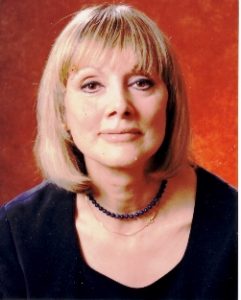
Professor Jane Plant CBE DSc FRSE FRSM
Anglo American Professor of Geochemistry, Imperial College, London
Professor Jane Plant gave the 6th Annual Campbell Lecture entitled: “Mountains to climb”. Jane describes her career in the then male-dominated British Geological Survey (BGS) as the first woman to be appointed as a Scientific Officer rather than in a technical grade in 1967. She describes how she started work cataloguing other people’s scientific reports and performing routine X-ray fluorescence analysis on ground rock powders before embarking on a path that would see her become the Chief Geochemist and subsequently the Chief Scientist of the BGS.
Jane describes her early fascination with geology, especially plate tectonics which was dominating Earth Science thinking in the late 1960s and 1970s. She also describes how she developed the methods which enabled the BGS to prepare the first systematic high-resolution geochemical maps in the world – methods subsequently adopted to prepare a geochemical database of Europe and a Global Geochemical Database. She shows how such geochemical maps have been used, together with other systematic BGS databases such as gravity and magnetics, to understand the plate-tectonic evolution of the British Isles, with particular reference to the genesis of its mineral deposits including uranium and gold; and how such studies helped in turn to understand similar types of ore deposits worldwide.
Jane describes her work on the links between environmental geochemistry and human health, a topic that still fascinates her and which she continues to research as Anglo American Professor of Geochemistry at Imperial College, London. As examples of such links, she describes Keshan disease in China, which is related to Se deficiency; cancer caused by toxic amounts of arsenic in Bangladesh and China; and neurological degeneration caused by mercury in Japan. Finally, she describes her work on the Royal Commission for Environmental Pollution and on the UK Chemical Stakeholder Forum and as Chairman of the Advisory Committee on Hazardous Substances, helping to remove toxic man-made substances such as pesticides and industrial chemicals from use.wiset
Campbell Lecture 2008
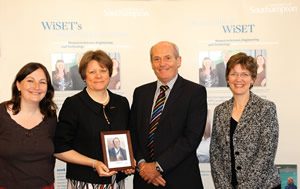
Professor Julia King
Professor Julia King gave the 5th Annual Campbell Lecture entitled: “From short cracks to glass ceilings: Alice’s advice on a career in engineering” on Weds 21st May. The talk was co-hosted by the Women in Science, Engineering and Technology (WiSET) Group and the School of Engineering Sciences.
Professor King reflected on her research interests and career to date, which has spanned both academia and industry, she has worked in Rolls Royce at senior management level and has now returned to the world of higher education as Vice-Chancellor of Aston University. She particularly reflected on the challenges and opportunities that a diverse work force can offer, with particular emphasis on the issues faced by women in engineering, and showed some interesting analysis of the leaky pipeline effect (decreasing proportions at increasing seniority level) for women in SET, together with some recommendations for good practice that HE institutions should follow.
Professor King has been recognised for her work by many awards and honours during her career, including the Fellowship of the Royal Academy of Engineering in 1997, and the CBE in 1999 for services to Materials Engineering. She has published more than 160 papers on fatigue and fracture in structural materials, materials issues in aero engines, and advances in marine propulsion technology.
Campbell Lecture 2007
Professor Deborah Estrin
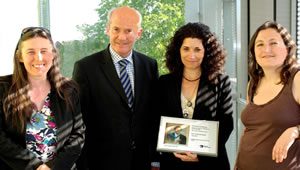
The University hosted its 4th Campbell Lecture “Wireless Sensing Systems: From ecosystems to human systems” on Tuesday, May 1st 2007. The speaker was Professor Deborah Estrin of the University of California, Los Angeles. The lecture was jointly sponsored by WiSET (Women in Science, Engineering and Technology) and the School of Electronics and Computer Science.
The focus of Professor Estrin’s lecture was on the way that sensing, computation and wireless communications have been combined in integrated, low-power devices, and networks of these devices embedded in the physical world.
‘Looking back over the past few years we have made significant progress towards the vision of programmable, multi-modal, multi-scale, and multi-use observatories,’ she said. ‘We have made our greatest strides in these applications using judicious application of server-side and in situ processing, mobility at multiple scales, and multi-scale data and models as context for in situ measurements.’ Professor Estrin considered how these lessons and new technologies are now being applied to humans as well as natural systems, in particular by exploring use of the installed base of image and acoustic sensors that we all carry around with us – our mobile phones.
Professor Deborah Estrin holds the Jon Postel Chair in Computer Networks at UCLA and is Founding Director of the NSF-fundedCenter for Embedded Networked Sensing (CENS). She has recently been awarded a 2007 Woman of Vision Award by the Anita Borg Institute.
Campbell Lecture 2006
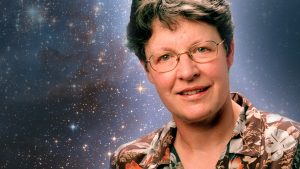
Professor Bell Burnell
The University hosted its 3rd Campbell Lecture on Tuesday, May 2nd 2006. The speaker was Professor Jocelyn Bell Burnell, Visiting Professor at the University of and a Professorial Fellowship at Mansfield College, Oxford. Her lecture was entitled ‘Careering through Astronomy.
Professor Bell Burnell, is the discoverer of the first radio pulsars. She has been awarded Oppenheimer prize, the Michelson medal, the Tinsley prize and the Magellanic Premium by learned bodies in the US and the Herschel Medal by the Royal Astronomical Society. She was made a CBE in 1999 and that year also won the Edinburgh Medal for services to science and society. Jocelyn became an FRS in 2003, and FRSE in 2004. She has served as President of the Royal Astronomical Society (2002-2004) and was elected a Foreign Associate of the US National Academy of Sciences in 2005.
Professor Bell Burnell spoke of her early academic career in a single sex girl’s school, the Physics department in and later as a graduate student at an all women’s college and the various challenges that these had offered. A ‘live’ demonstration of the Doppler effect was followed by a lively discussion of the role of women in SET and their potential to develop the public appreciation and understanding of science.
Annual Campbell Lecture 2005
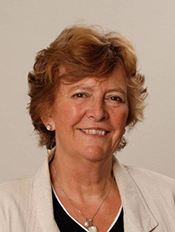
Dame Julia Higgins
The WiSET group hosted its second Campbell Lecture and this year’s speaker was Professor Dame Julia Higgins DBE FRS FREng, who spoke on ‘The responsibility of being a scientist’.
Dame Julia Higgins is Professor of Polymer Science at Imperial College London, where she is also Director of the Graduate School of Engineering and Physical Sciences. She is Chair of the Engineering and Physical Sciences Research Council (EPSRC) and Foreign Secretary and Vice President of the Royal Society. Dame Julia has a strong interest in the participation of women in science, engineering and technology (SET) and is a member and past chair of the steering group of the Athena Project, which exists to support the advancement of women in SET in higher education.
During her lecture to an overflowing Chemistry Lecture theatre, she spoke of her role in overseeing the Royal Society’s international relations programme and in particular her unexpected but stimulating contacts with other scientists and scientific academies. She then went on to discuss the responsibilities of a scientist not only to do good science and to use science well but also to face the challenges of engaging and communicating with the public.
At the end of her lecture, the Deputy Vice Chancellor Professor Paul Curran presented Dame Julia with a commemorative image of Ishbell Campbell. Ishbell Campbell (1906-1997) after whom the WiSET lecture was named was one of the founding academics of the University when it received its Charter, a Reader in Chemistry and a committed teacher and inspiration for women in science.

